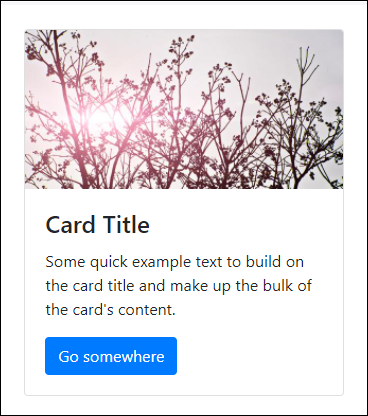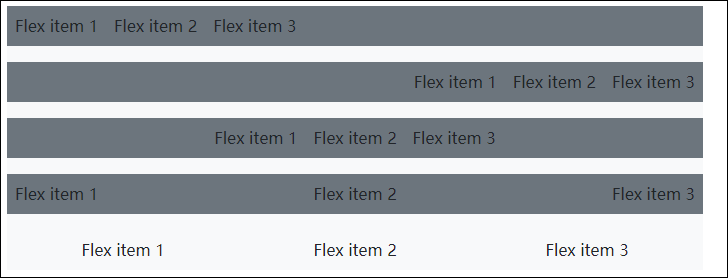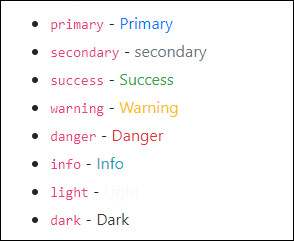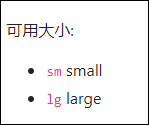使用BootstrapVue相关组件,构建Vue项目界面
基于Vue的前端框架有很多,Element算一个,而BootstrapVue也可以非常不错的一个,毕竟Bootstrap也是CSS中的大佬级别的,它和Vue的整合,使得开发起来更加方便了。BootstrapVue 是基于 Bootstrap v4 + Vue.js 的前端 UI 框架。它是流行的 Bootstrap 框架与 Vue.js 的集成。这个包称为 BootstrapVue。它允许我们使用与 Bootstrap(v4)集成的自定义组件。
使用 BootstrapVue,任何人都可以从 Vanilla.js 或 jQuery 切换到 Vue.js,而无需担心 Bootstrap 对 jQuery 的严重依赖,甚至无法找到解决方法。这就是 BootstrapVue 的救援方式。它有助于弥补这一差距,并允许 Vue 开发人员能够轻松地在他们的项目中使用 Bootstrap。BootstrapVue不依赖Jquery。

1、BootstrapVue的安装使用
我们假设你已经有Vue的项目环境,那么BootstrapVue的安装使用介绍就很容易了,直接使用npm安装即可。
npm install bootstrap-vue bootstrap
上面的命令将会安装BootstrapVue和Bootstrap包。 BoostrapVue包中包含所有BootstrapVue组件,常规Bootstrap包含CSS文件。
接下来,让我们设置刚刚安装的BootstrapVue包。转到你的main.js文件并将这行代码添加到合适的位置,另外还需要将Bootstrap CSS文件导入到项目中。
import BootstrapVue from 'bootstrap-vue' Vue.use(BootstrapVue) import 'bootstrap/dist/css/bootstrap.css' import 'bootstrap-vue/dist/bootstrap-vue.css'
那么一般简单的main.js文件内容如下所示。
//src/main.js import Vue from 'vue' import App from './App.vue' import BootstrapVue from 'bootstrap-vue' import 'bootstrap/dist/css/bootstrap.css' import 'bootstrap-vue/dist/bootstrap-vue.css' Vue.use(BootstrapVue) Vue.config.productionTip = false new Vue({ render: h => h(App), }).$mount('#app')
如果我们项目中使用了其他组件模块,那么这些可能会有所不同。
2、BootstrapVue的组件使用
学习一项新东西,我们一般先了解一下相关的文档。
GitHub库的地址:https://github.com/topics/bootstrapvue
BootstrapVue的官网地址(可能受限无法访问):https://bootstrap-vue.js.org/
BootstrapVue的中文网站地址如下: https://code.z01.com/bootstrap-vue/
通过在Vue项目中引入对应的 BootstrapVue,那么它的相关组件使用就参考官网的介绍了解即可。BootstrapVue中有很多和Bootstrap一样的组件,不过标签前缀需要加上b-

例如对于常用的按钮界面代码处理,如下所示。
<div> <b-button>Button</b-button> <b-button variant="danger">Button</b-button> <b-button variant="success">Button</b-button> <b-button variant="outline-primary">Button</b-button> </div>
界面如下所示,很有Bootstrap的风格!我们可以看到原先Bootstrap上的html的button加多了一个前缀b-,变为了b-button了。

卡片Card控件使用代码如下所示
<div> <b-card title="Card Title" img-src="https://picsum.photos/600/300/?image=25" img-alt="Image" img-top tag="article" style="max-width: 20rem;" class="mb-2" > <b-card-text> Some quick example text to build on the card title and make up the bulk of the card's content. </b-card-text> <b-button href="#" variant="primary">Go somewhere</b-button> </b-card> </div>

其中类class中的mb-2就是边距的定义,参考说明如下所示。

另外可能还有接触到 p-2,pt-2,py-2,px-2 等类似的定义,后面小节再行说明。
另外Flex的布局也需了解下。
<div class="bg-light mb-3"> <div class="d-flex justify-content-start bg-secondary mb-3"> <div class="p-2">Flex item 1</div> <div class="p-2">Flex item 2</div> <div class="p-2">Flex item 3</div> </div> <div class="d-flex justify-content-end bg-secondary mb-3"> <div class="p-2">Flex item 1</div> <div class="p-2">Flex item 2</div> <div class="p-2">Flex item 3</div> </div> <div class="d-flex justify-content-center bg-secondary mb-3"> <div class="p-2">Flex item 1</div> <div class="p-2">Flex item 2</div> <div class="p-2">Flex item 3</div> </div> <div class="d-flex justify-content-between bg-secondary mb-3"> <div class="p-2">Flex item 1</div> <div class="p-2">Flex item 2</div> <div class="p-2">Flex item 3</div> </div> <div class="d-flex justify-content-around bg-light mb-3"> <div class="p-2">Flex item 1</div> <div class="p-2">Flex item 2</div> <div class="p-2">Flex item 3</div> </div> </div>
界面效果如下所示。

我们来一个展示栅格的例子,显示卡片中图片,文字等信息。
<b-container> <div v-if="list.length"> <b-row> <template v-for="data in list"> <b-col sm="4" v-bind:key="data.index"> <b-card v-bind:title="data.strCategory" v-bind:img-src="data.strCategoryThumb" img-alt="Image" img-top tag="article" style="max-width: 20rem;" class="mb-2"> <b-card-text>{{ `${data.strCategoryDescription.slice(0,100)}...` }}</b-card-text> <b-button href="#" variant="primary">View food</b-button> </b-card> </b-col> </template> </b-row> </div> <div v-else> <h5>No meals available yet 😢</h5> </div> </b-container>
整体界面效果如下所示

3、BootstrapVue的相关介绍
BootstrapVue的很多概念还是和Bootstrap的类似,毕竟Bootstrap的CSS已经是标准的了。不过我们需要了解相关的布局、颜色、类定义等信息,以确认他们之间的一些差异。
主题色彩
Bootstrap v4.4 SCSS中定义的默认颜色如下,所有主题颜色将自动作为所有BootstrapVue组件的color 变量提供。

颜色变量

组件Size属性

间距处理
影响元素之间的间距是可以通过style的margin或padding属性来实现,但这两个属性本意并不相同;margin影响的是本元素与相邻外界元素之间的距离,这里简称外边距;padding影响的元素本身与其内部子元素之间的距离,简称为内填充。
bootstrap4提供了简写的class名,名称分别以m-开头和p-开头的类。
一、影响距离大小的值有
0,1,2,3,4,5,auto
(1)、margin值有
|
class名 |
等价的style |
|
m-0 |
等价于{margin:0 !important} |
|
m-1 |
等价于{margin:0.25rem !important} |
|
m-2 |
等价于{margin:0.5rem !important} |
|
m-3 |
等价于{margin:1rem !important} |
|
m-4 |
等价于{margin:1.5rem !important} |
|
m-5 |
等价于{margin:3rem !important} |
|
m-auto |
等价于{margin:auto !important} |
(2)、padding值有
|
class名 |
等价的style |
|
p-0 |
等价于{padding:0 !important} |
|
p-1 |
等价于{padding:0.25rem !important} |
|
p-2 |
等价于{padding:0.5rem !important} |
|
p-3 |
等价于{padding:1rem !important} |
|
p-4 |
等价于{padding:1.5rem !important} |
|
p-5 |
等价于{padding:3rem !important} |
|
p-auto |
等价于{padding:auto !important} |
二、调整某一侧的边距
有几个缩写,t,b,l,r,x,y含义分别是top,bottom,left,right,left和right,top和bottom
(1)margin例子,距离大小可以0-5与auto,这里只用期中一个值来说明含义
|
class名 |
等价的style |
|
mt-2 |
{margin-top: 0.5rem !important} |
|
mb-2 |
{margin-bottom: 0.5rem !important} |
|
ml-2 |
{margin-left: 0.5rem !important} |
|
mr-2 |
{margin-right: 0.5rem !important} |
|
mx-2 |
{margin-right: 0.5rem !important;margin-left: 0.5rem !important} |
|
my-2 |
{margin-top: 0.5rem !important;margin-bottom: 0.5rem !important} |
(2)padding例子
|
class名 |
等价的style |
|
pt-2 |
{padding-top: 0.5rem !important} |
|
pb-2 |
{padding-bottom: 0.5rem !important} |
|
pl-2 |
{padding-left: 0.5rem !important} |
|
pr-2 |
{padding-right: 0.5rem !important} |
|
px-2 |
{padding-right: 0.5rem !important;margin-left: 0.5rem !important} |
|
py-2 |
{padding-top: 0.5rem !important;margin-bottom: 0.5rem !important} |
 专注于代码生成工具、.Net/.NetCore 框架架构及软件开发,以及各种Vue.js的前端技术应用。著有Winform开发框架/混合式开发框架、微信开发框架、Bootstrap开发框架、ABP开发框架、SqlSugar开发框架等框架产品。
专注于代码生成工具、.Net/.NetCore 框架架构及软件开发,以及各种Vue.js的前端技术应用。著有Winform开发框架/混合式开发框架、微信开发框架、Bootstrap开发框架、ABP开发框架、SqlSugar开发框架等框架产品。
转载请注明出处:撰写人:伍华聪 http://www.iqidi.com


